Entrepreneurship and Small Business Management Report, UK
VerifiedAdded on 2020/01/28
|15
|5516
|157
Report
AI Summary
This report delves into the multifaceted world of entrepreneurship and small business management. It begins by defining entrepreneurship and exploring different types of entrepreneurial ventures, including lifestyle, survival, managed growth, and aggressive growth ventures. The report then examines the similarities and differences between various entrepreneurial approaches, such as small business ventures, scalable start-up ventures, social ventures, and large company ventures, focusing on aspects like marketing communication and goals. The second task of the report assesses the impact of micro and small businesses on the UK economy, highlighting their role in job creation, diversification, and contribution to GDP, and the effect of the micro and small businesses on the overall economy. The report further investigates the characteristics, traits, and skills of successful entrepreneurs, along with entrepreneurial motivation and mind-set. Finally, it examines the potential hindrances that background and experience can pose to entrepreneurship. Overall, the report provides a comprehensive overview of entrepreneurship and its significance in the business landscape.

Entrepreneurship and Small Business
Management
Management
Paraphrase This Document
Need a fresh take? Get an instant paraphrase of this document with our AI Paraphraser
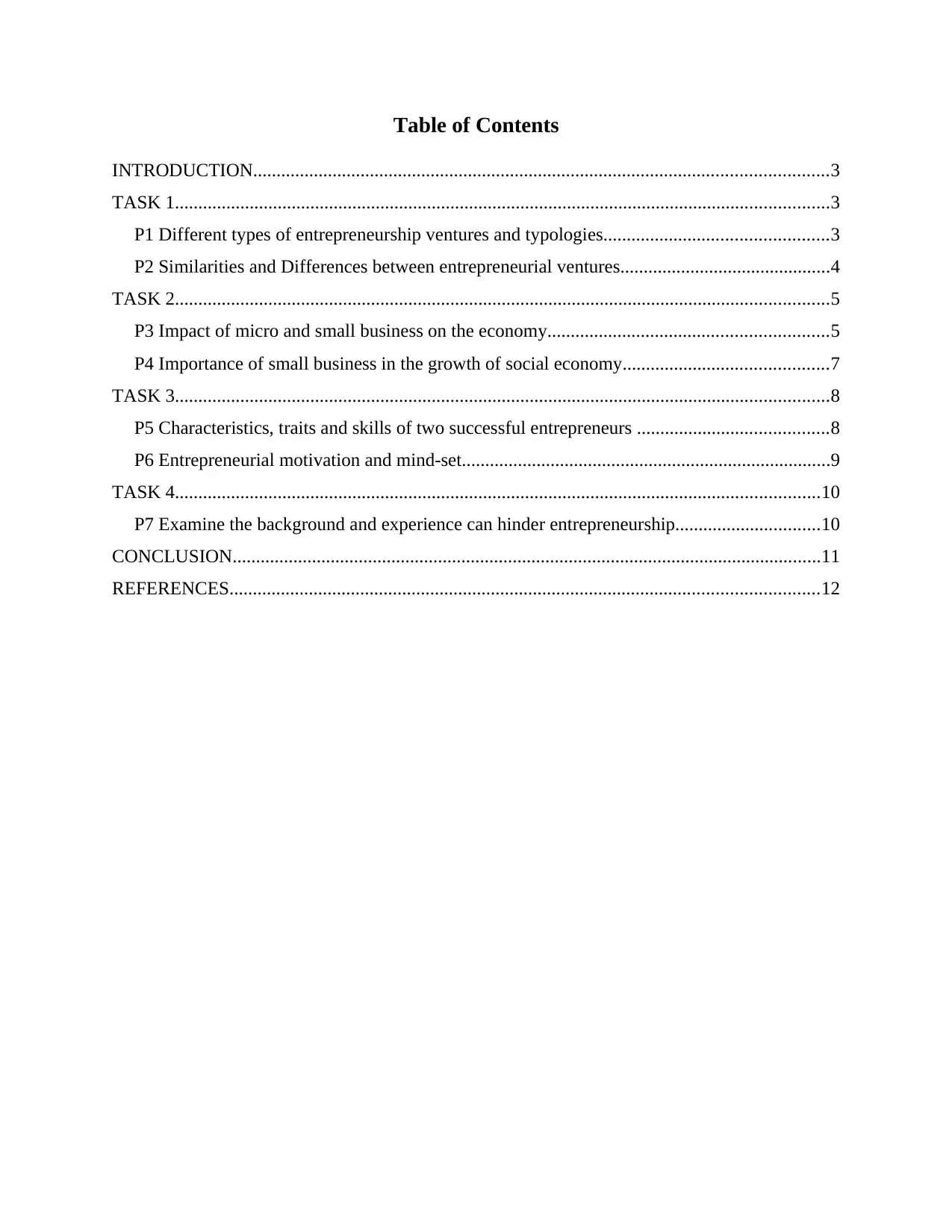
Table of Contents
INTRODUCTION...........................................................................................................................3
TASK 1............................................................................................................................................3
P1 Different types of entrepreneurship ventures and typologies................................................3
P2 Similarities and Differences between entrepreneurial ventures.............................................4
TASK 2............................................................................................................................................5
P3 Impact of micro and small business on the economy............................................................5
P4 Importance of small business in the growth of social economy............................................7
TASK 3............................................................................................................................................8
P5 Characteristics, traits and skills of two successful entrepreneurs .........................................8
P6 Entrepreneurial motivation and mind-set...............................................................................9
TASK 4..........................................................................................................................................10
P7 Examine the background and experience can hinder entrepreneurship...............................10
CONCLUSION..............................................................................................................................11
REFERENCES..............................................................................................................................12
INTRODUCTION...........................................................................................................................3
TASK 1............................................................................................................................................3
P1 Different types of entrepreneurship ventures and typologies................................................3
P2 Similarities and Differences between entrepreneurial ventures.............................................4
TASK 2............................................................................................................................................5
P3 Impact of micro and small business on the economy............................................................5
P4 Importance of small business in the growth of social economy............................................7
TASK 3............................................................................................................................................8
P5 Characteristics, traits and skills of two successful entrepreneurs .........................................8
P6 Entrepreneurial motivation and mind-set...............................................................................9
TASK 4..........................................................................................................................................10
P7 Examine the background and experience can hinder entrepreneurship...............................10
CONCLUSION..............................................................................................................................11
REFERENCES..............................................................................................................................12
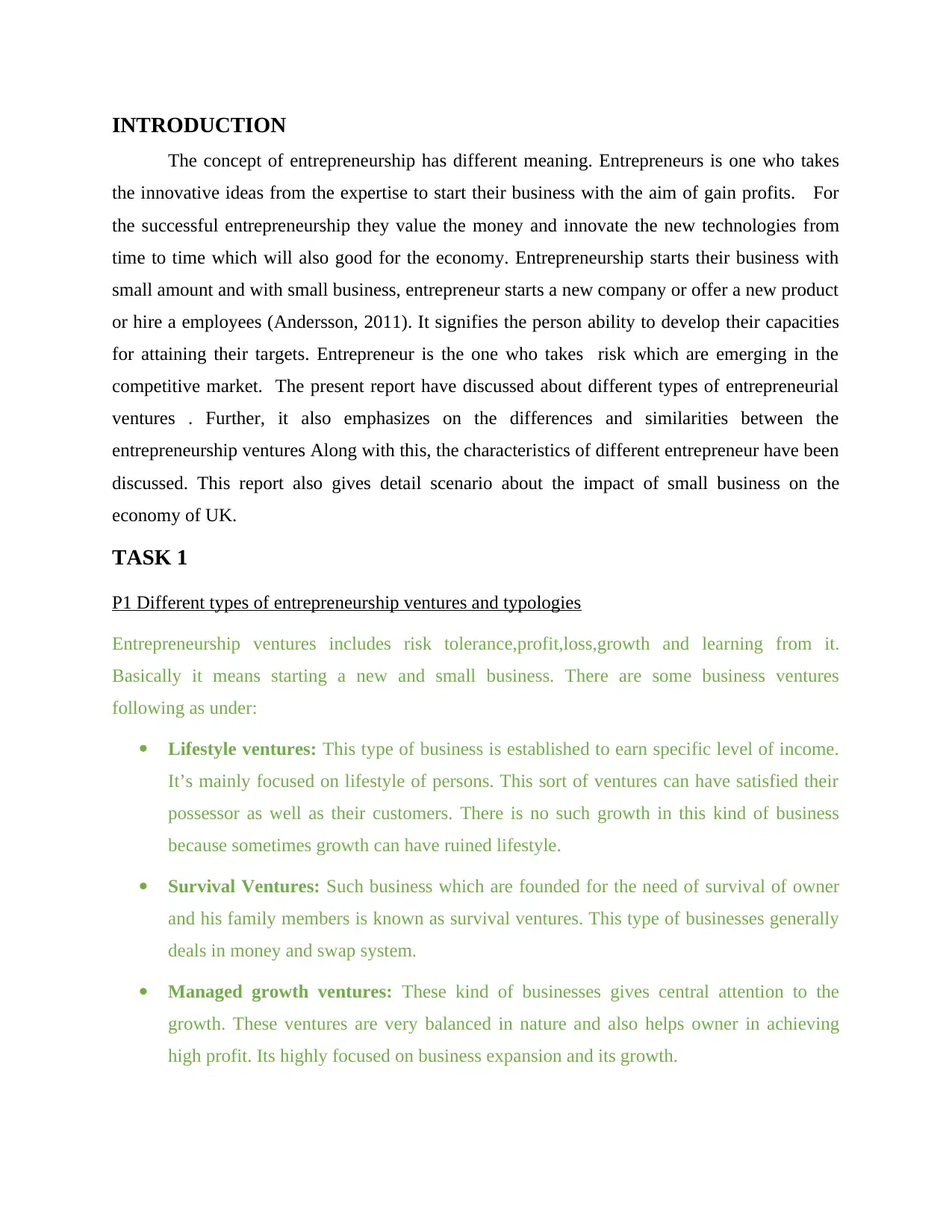
INTRODUCTION
The concept of entrepreneurship has different meaning. Entrepreneurs is one who takes
the innovative ideas from the expertise to start their business with the aim of gain profits. For
the successful entrepreneurship they value the money and innovate the new technologies from
time to time which will also good for the economy. Entrepreneurship starts their business with
small amount and with small business, entrepreneur starts a new company or offer a new product
or hire a employees (Andersson, 2011). It signifies the person ability to develop their capacities
for attaining their targets. Entrepreneur is the one who takes risk which are emerging in the
competitive market. The present report have discussed about different types of entrepreneurial
ventures . Further, it also emphasizes on the differences and similarities between the
entrepreneurship ventures Along with this, the characteristics of different entrepreneur have been
discussed. This report also gives detail scenario about the impact of small business on the
economy of UK.
TASK 1
P1 Different types of entrepreneurship ventures and typologies
Entrepreneurship ventures includes risk tolerance,profit,loss,growth and learning from it.
Basically it means starting a new and small business. There are some business ventures
following as under:
Lifestyle ventures: This type of business is established to earn specific level of income.
It’s mainly focused on lifestyle of persons. This sort of ventures can have satisfied their
possessor as well as their customers. There is no such growth in this kind of business
because sometimes growth can have ruined lifestyle.
Survival Ventures: Such business which are founded for the need of survival of owner
and his family members is known as survival ventures. This type of businesses generally
deals in money and swap system.
Managed growth ventures: These kind of businesses gives central attention to the
growth. These ventures are very balanced in nature and also helps owner in achieving
high profit. Its highly focused on business expansion and its growth.
The concept of entrepreneurship has different meaning. Entrepreneurs is one who takes
the innovative ideas from the expertise to start their business with the aim of gain profits. For
the successful entrepreneurship they value the money and innovate the new technologies from
time to time which will also good for the economy. Entrepreneurship starts their business with
small amount and with small business, entrepreneur starts a new company or offer a new product
or hire a employees (Andersson, 2011). It signifies the person ability to develop their capacities
for attaining their targets. Entrepreneur is the one who takes risk which are emerging in the
competitive market. The present report have discussed about different types of entrepreneurial
ventures . Further, it also emphasizes on the differences and similarities between the
entrepreneurship ventures Along with this, the characteristics of different entrepreneur have been
discussed. This report also gives detail scenario about the impact of small business on the
economy of UK.
TASK 1
P1 Different types of entrepreneurship ventures and typologies
Entrepreneurship ventures includes risk tolerance,profit,loss,growth and learning from it.
Basically it means starting a new and small business. There are some business ventures
following as under:
Lifestyle ventures: This type of business is established to earn specific level of income.
It’s mainly focused on lifestyle of persons. This sort of ventures can have satisfied their
possessor as well as their customers. There is no such growth in this kind of business
because sometimes growth can have ruined lifestyle.
Survival Ventures: Such business which are founded for the need of survival of owner
and his family members is known as survival ventures. This type of businesses generally
deals in money and swap system.
Managed growth ventures: These kind of businesses gives central attention to the
growth. These ventures are very balanced in nature and also helps owner in achieving
high profit. Its highly focused on business expansion and its growth.
⊘ This is a preview!⊘
Do you want full access?
Subscribe today to unlock all pages.

Trusted by 1+ million students worldwide
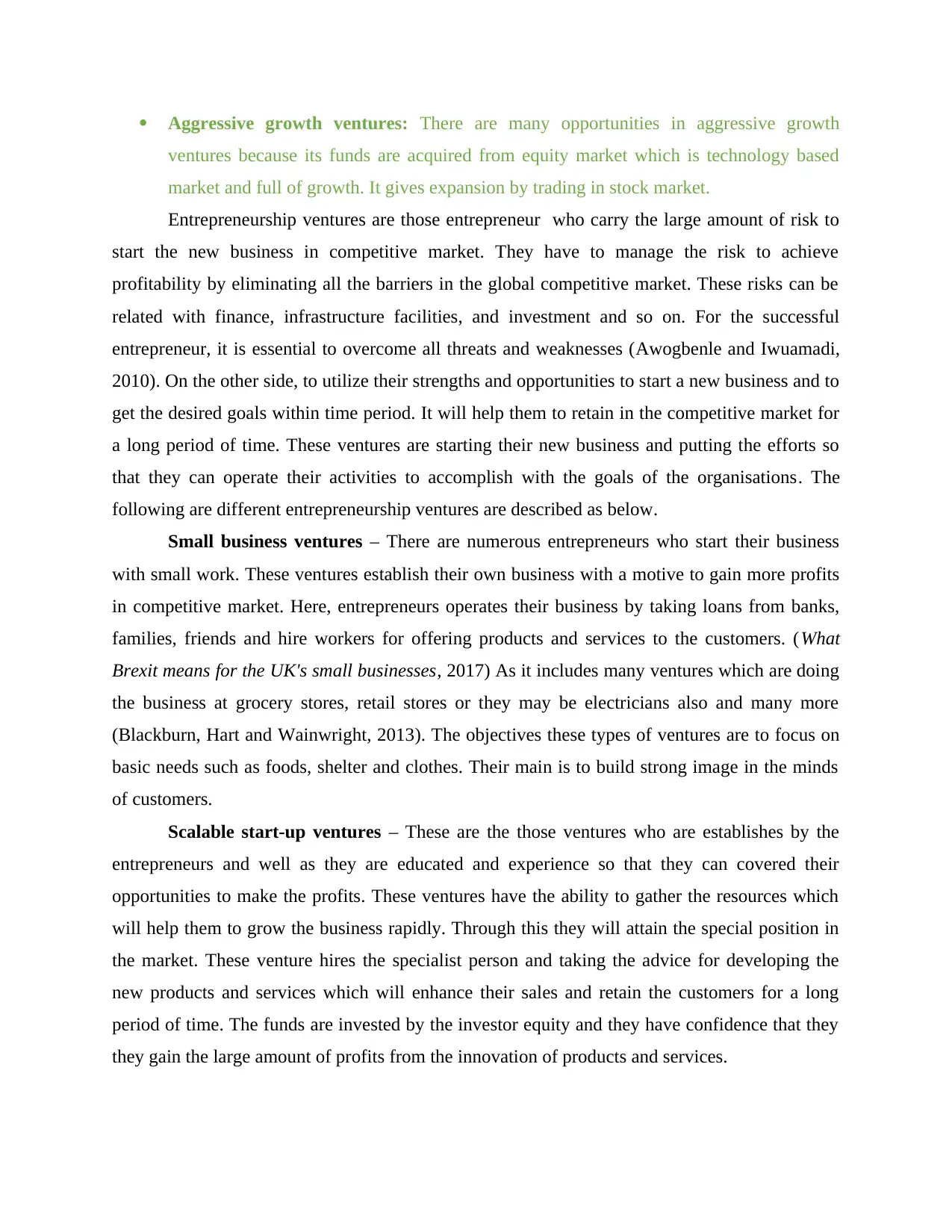
Aggressive growth ventures: There are many opportunities in aggressive growth
ventures because its funds are acquired from equity market which is technology based
market and full of growth. It gives expansion by trading in stock market.
Entrepreneurship ventures are those entrepreneur who carry the large amount of risk to
start the new business in competitive market. They have to manage the risk to achieve
profitability by eliminating all the barriers in the global competitive market. These risks can be
related with finance, infrastructure facilities, and investment and so on. For the successful
entrepreneur, it is essential to overcome all threats and weaknesses (Awogbenle and Iwuamadi,
2010). On the other side, to utilize their strengths and opportunities to start a new business and to
get the desired goals within time period. It will help them to retain in the competitive market for
a long period of time. These ventures are starting their new business and putting the efforts so
that they can operate their activities to accomplish with the goals of the organisations. The
following are different entrepreneurship ventures are described as below.
Small business ventures – There are numerous entrepreneurs who start their business
with small work. These ventures establish their own business with a motive to gain more profits
in competitive market. Here, entrepreneurs operates their business by taking loans from banks,
families, friends and hire workers for offering products and services to the customers. (What
Brexit means for the UK's small businesses, 2017) As it includes many ventures which are doing
the business at grocery stores, retail stores or they may be electricians also and many more
(Blackburn, Hart and Wainwright, 2013). The objectives these types of ventures are to focus on
basic needs such as foods, shelter and clothes. Their main is to build strong image in the minds
of customers.
Scalable start-up ventures – These are the those ventures who are establishes by the
entrepreneurs and well as they are educated and experience so that they can covered their
opportunities to make the profits. These ventures have the ability to gather the resources which
will help them to grow the business rapidly. Through this they will attain the special position in
the market. These venture hires the specialist person and taking the advice for developing the
new products and services which will enhance their sales and retain the customers for a long
period of time. The funds are invested by the investor equity and they have confidence that they
they gain the large amount of profits from the innovation of products and services.
ventures because its funds are acquired from equity market which is technology based
market and full of growth. It gives expansion by trading in stock market.
Entrepreneurship ventures are those entrepreneur who carry the large amount of risk to
start the new business in competitive market. They have to manage the risk to achieve
profitability by eliminating all the barriers in the global competitive market. These risks can be
related with finance, infrastructure facilities, and investment and so on. For the successful
entrepreneur, it is essential to overcome all threats and weaknesses (Awogbenle and Iwuamadi,
2010). On the other side, to utilize their strengths and opportunities to start a new business and to
get the desired goals within time period. It will help them to retain in the competitive market for
a long period of time. These ventures are starting their new business and putting the efforts so
that they can operate their activities to accomplish with the goals of the organisations. The
following are different entrepreneurship ventures are described as below.
Small business ventures – There are numerous entrepreneurs who start their business
with small work. These ventures establish their own business with a motive to gain more profits
in competitive market. Here, entrepreneurs operates their business by taking loans from banks,
families, friends and hire workers for offering products and services to the customers. (What
Brexit means for the UK's small businesses, 2017) As it includes many ventures which are doing
the business at grocery stores, retail stores or they may be electricians also and many more
(Blackburn, Hart and Wainwright, 2013). The objectives these types of ventures are to focus on
basic needs such as foods, shelter and clothes. Their main is to build strong image in the minds
of customers.
Scalable start-up ventures – These are the those ventures who are establishes by the
entrepreneurs and well as they are educated and experience so that they can covered their
opportunities to make the profits. These ventures have the ability to gather the resources which
will help them to grow the business rapidly. Through this they will attain the special position in
the market. These venture hires the specialist person and taking the advice for developing the
new products and services which will enhance their sales and retain the customers for a long
period of time. The funds are invested by the investor equity and they have confidence that they
they gain the large amount of profits from the innovation of products and services.
Paraphrase This Document
Need a fresh take? Get an instant paraphrase of this document with our AI Paraphraser
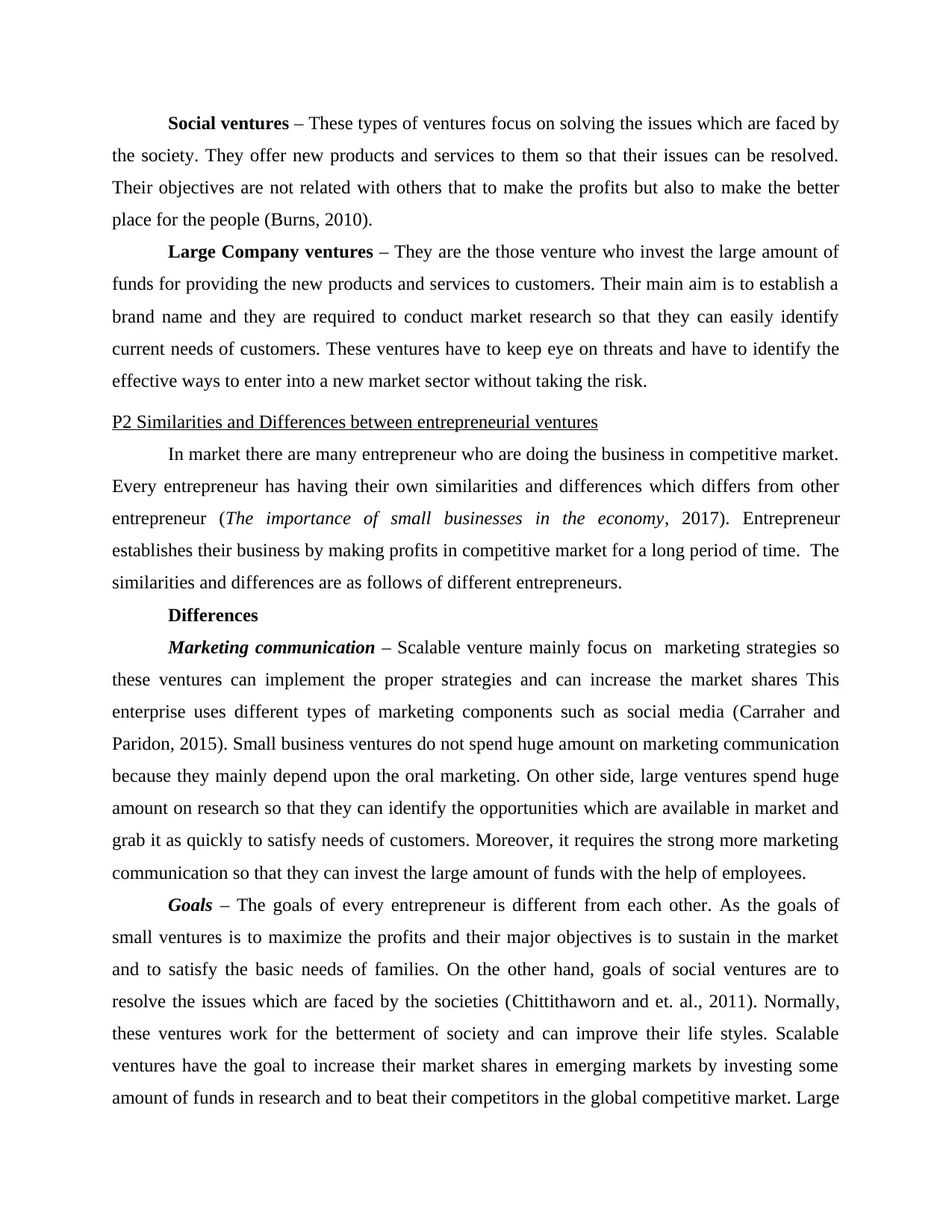
Social ventures – These types of ventures focus on solving the issues which are faced by
the society. They offer new products and services to them so that their issues can be resolved.
Their objectives are not related with others that to make the profits but also to make the better
place for the people (Burns, 2010).
Large Company ventures – They are the those venture who invest the large amount of
funds for providing the new products and services to customers. Their main aim is to establish a
brand name and they are required to conduct market research so that they can easily identify
current needs of customers. These ventures have to keep eye on threats and have to identify the
effective ways to enter into a new market sector without taking the risk.
P2 Similarities and Differences between entrepreneurial ventures
In market there are many entrepreneur who are doing the business in competitive market.
Every entrepreneur has having their own similarities and differences which differs from other
entrepreneur (The importance of small businesses in the economy, 2017). Entrepreneur
establishes their business by making profits in competitive market for a long period of time. The
similarities and differences are as follows of different entrepreneurs.
Differences
Marketing communication – Scalable venture mainly focus on marketing strategies so
these ventures can implement the proper strategies and can increase the market shares This
enterprise uses different types of marketing components such as social media (Carraher and
Paridon, 2015). Small business ventures do not spend huge amount on marketing communication
because they mainly depend upon the oral marketing. On other side, large ventures spend huge
amount on research so that they can identify the opportunities which are available in market and
grab it as quickly to satisfy needs of customers. Moreover, it requires the strong more marketing
communication so that they can invest the large amount of funds with the help of employees.
Goals – The goals of every entrepreneur is different from each other. As the goals of
small ventures is to maximize the profits and their major objectives is to sustain in the market
and to satisfy the basic needs of families. On the other hand, goals of social ventures are to
resolve the issues which are faced by the societies (Chittithaworn and et. al., 2011). Normally,
these ventures work for the betterment of society and can improve their life styles. Scalable
ventures have the goal to increase their market shares in emerging markets by investing some
amount of funds in research and to beat their competitors in the global competitive market. Large
the society. They offer new products and services to them so that their issues can be resolved.
Their objectives are not related with others that to make the profits but also to make the better
place for the people (Burns, 2010).
Large Company ventures – They are the those venture who invest the large amount of
funds for providing the new products and services to customers. Their main aim is to establish a
brand name and they are required to conduct market research so that they can easily identify
current needs of customers. These ventures have to keep eye on threats and have to identify the
effective ways to enter into a new market sector without taking the risk.
P2 Similarities and Differences between entrepreneurial ventures
In market there are many entrepreneur who are doing the business in competitive market.
Every entrepreneur has having their own similarities and differences which differs from other
entrepreneur (The importance of small businesses in the economy, 2017). Entrepreneur
establishes their business by making profits in competitive market for a long period of time. The
similarities and differences are as follows of different entrepreneurs.
Differences
Marketing communication – Scalable venture mainly focus on marketing strategies so
these ventures can implement the proper strategies and can increase the market shares This
enterprise uses different types of marketing components such as social media (Carraher and
Paridon, 2015). Small business ventures do not spend huge amount on marketing communication
because they mainly depend upon the oral marketing. On other side, large ventures spend huge
amount on research so that they can identify the opportunities which are available in market and
grab it as quickly to satisfy needs of customers. Moreover, it requires the strong more marketing
communication so that they can invest the large amount of funds with the help of employees.
Goals – The goals of every entrepreneur is different from each other. As the goals of
small ventures is to maximize the profits and their major objectives is to sustain in the market
and to satisfy the basic needs of families. On the other hand, goals of social ventures are to
resolve the issues which are faced by the societies (Chittithaworn and et. al., 2011). Normally,
these ventures work for the betterment of society and can improve their life styles. Scalable
ventures have the goal to increase their market shares in emerging markets by investing some
amount of funds in research and to beat their competitors in the global competitive market. Large
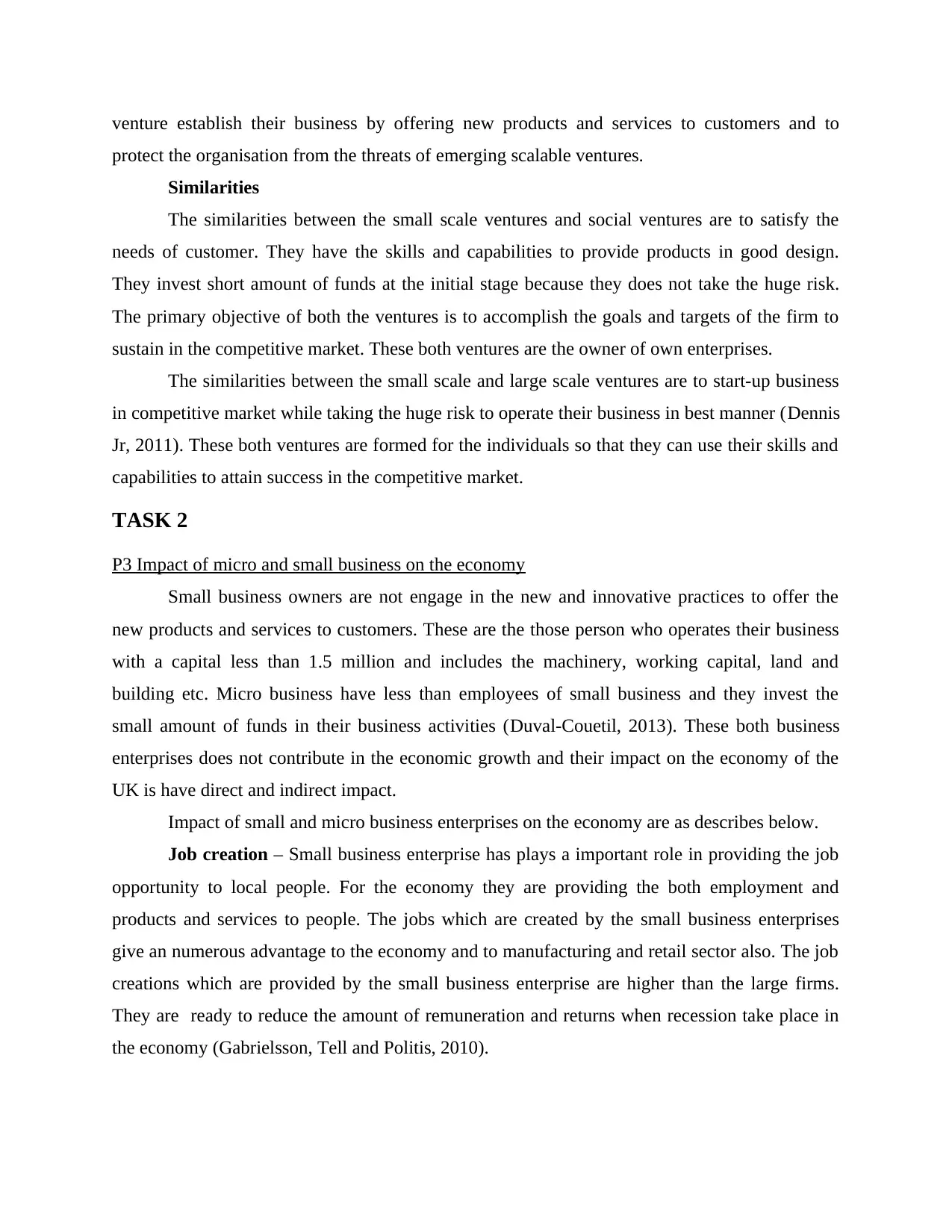
venture establish their business by offering new products and services to customers and to
protect the organisation from the threats of emerging scalable ventures.
Similarities
The similarities between the small scale ventures and social ventures are to satisfy the
needs of customer. They have the skills and capabilities to provide products in good design.
They invest short amount of funds at the initial stage because they does not take the huge risk.
The primary objective of both the ventures is to accomplish the goals and targets of the firm to
sustain in the competitive market. These both ventures are the owner of own enterprises.
The similarities between the small scale and large scale ventures are to start-up business
in competitive market while taking the huge risk to operate their business in best manner (Dennis
Jr, 2011). These both ventures are formed for the individuals so that they can use their skills and
capabilities to attain success in the competitive market.
TASK 2
P3 Impact of micro and small business on the economy
Small business owners are not engage in the new and innovative practices to offer the
new products and services to customers. These are the those person who operates their business
with a capital less than 1.5 million and includes the machinery, working capital, land and
building etc. Micro business have less than employees of small business and they invest the
small amount of funds in their business activities (Duval‐Couetil, 2013). These both business
enterprises does not contribute in the economic growth and their impact on the economy of the
UK is have direct and indirect impact.
Impact of small and micro business enterprises on the economy are as describes below.
Job creation – Small business enterprise has plays a important role in providing the job
opportunity to local people. For the economy they are providing the both employment and
products and services to people. The jobs which are created by the small business enterprises
give an numerous advantage to the economy and to manufacturing and retail sector also. The job
creations which are provided by the small business enterprise are higher than the large firms.
They are ready to reduce the amount of remuneration and returns when recession take place in
the economy (Gabrielsson, Tell and Politis, 2010).
protect the organisation from the threats of emerging scalable ventures.
Similarities
The similarities between the small scale ventures and social ventures are to satisfy the
needs of customer. They have the skills and capabilities to provide products in good design.
They invest short amount of funds at the initial stage because they does not take the huge risk.
The primary objective of both the ventures is to accomplish the goals and targets of the firm to
sustain in the competitive market. These both ventures are the owner of own enterprises.
The similarities between the small scale and large scale ventures are to start-up business
in competitive market while taking the huge risk to operate their business in best manner (Dennis
Jr, 2011). These both ventures are formed for the individuals so that they can use their skills and
capabilities to attain success in the competitive market.
TASK 2
P3 Impact of micro and small business on the economy
Small business owners are not engage in the new and innovative practices to offer the
new products and services to customers. These are the those person who operates their business
with a capital less than 1.5 million and includes the machinery, working capital, land and
building etc. Micro business have less than employees of small business and they invest the
small amount of funds in their business activities (Duval‐Couetil, 2013). These both business
enterprises does not contribute in the economic growth and their impact on the economy of the
UK is have direct and indirect impact.
Impact of small and micro business enterprises on the economy are as describes below.
Job creation – Small business enterprise has plays a important role in providing the job
opportunity to local people. For the economy they are providing the both employment and
products and services to people. The jobs which are created by the small business enterprises
give an numerous advantage to the economy and to manufacturing and retail sector also. The job
creations which are provided by the small business enterprise are higher than the large firms.
They are ready to reduce the amount of remuneration and returns when recession take place in
the economy (Gabrielsson, Tell and Politis, 2010).
⊘ This is a preview!⊘
Do you want full access?
Subscribe today to unlock all pages.

Trusted by 1+ million students worldwide
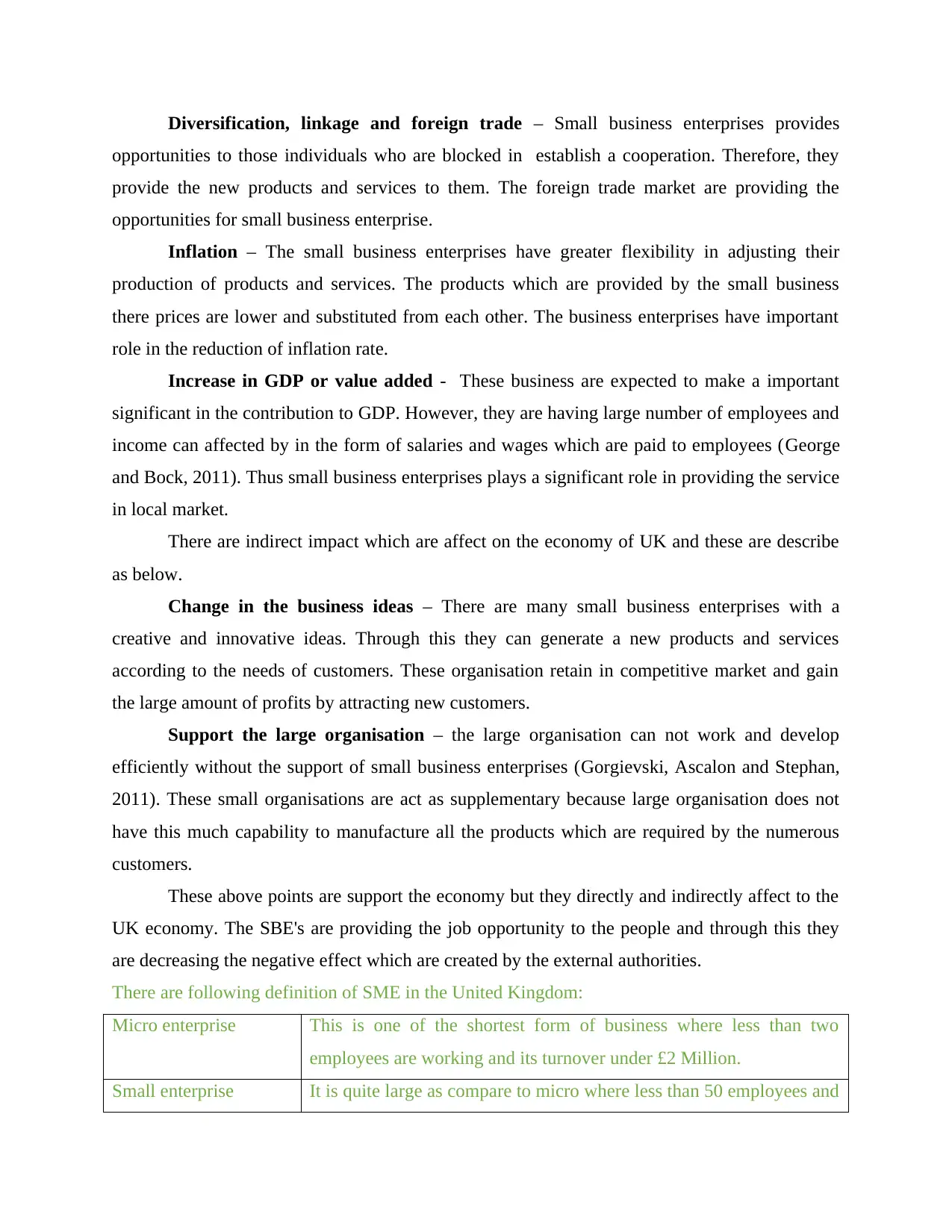
Diversification, linkage and foreign trade – Small business enterprises provides
opportunities to those individuals who are blocked in establish a cooperation. Therefore, they
provide the new products and services to them. The foreign trade market are providing the
opportunities for small business enterprise.
Inflation – The small business enterprises have greater flexibility in adjusting their
production of products and services. The products which are provided by the small business
there prices are lower and substituted from each other. The business enterprises have important
role in the reduction of inflation rate.
Increase in GDP or value added - These business are expected to make a important
significant in the contribution to GDP. However, they are having large number of employees and
income can affected by in the form of salaries and wages which are paid to employees (George
and Bock, 2011). Thus small business enterprises plays a significant role in providing the service
in local market.
There are indirect impact which are affect on the economy of UK and these are describe
as below.
Change in the business ideas – There are many small business enterprises with a
creative and innovative ideas. Through this they can generate a new products and services
according to the needs of customers. These organisation retain in competitive market and gain
the large amount of profits by attracting new customers.
Support the large organisation – the large organisation can not work and develop
efficiently without the support of small business enterprises (Gorgievski, Ascalon and Stephan,
2011). These small organisations are act as supplementary because large organisation does not
have this much capability to manufacture all the products which are required by the numerous
customers.
These above points are support the economy but they directly and indirectly affect to the
UK economy. The SBE's are providing the job opportunity to the people and through this they
are decreasing the negative effect which are created by the external authorities.
There are following definition of SME in the United Kingdom:
Micro enterprise This is one of the shortest form of business where less than two
employees are working and its turnover under £2 Million.
Small enterprise It is quite large as compare to micro where less than 50 employees and
opportunities to those individuals who are blocked in establish a cooperation. Therefore, they
provide the new products and services to them. The foreign trade market are providing the
opportunities for small business enterprise.
Inflation – The small business enterprises have greater flexibility in adjusting their
production of products and services. The products which are provided by the small business
there prices are lower and substituted from each other. The business enterprises have important
role in the reduction of inflation rate.
Increase in GDP or value added - These business are expected to make a important
significant in the contribution to GDP. However, they are having large number of employees and
income can affected by in the form of salaries and wages which are paid to employees (George
and Bock, 2011). Thus small business enterprises plays a significant role in providing the service
in local market.
There are indirect impact which are affect on the economy of UK and these are describe
as below.
Change in the business ideas – There are many small business enterprises with a
creative and innovative ideas. Through this they can generate a new products and services
according to the needs of customers. These organisation retain in competitive market and gain
the large amount of profits by attracting new customers.
Support the large organisation – the large organisation can not work and develop
efficiently without the support of small business enterprises (Gorgievski, Ascalon and Stephan,
2011). These small organisations are act as supplementary because large organisation does not
have this much capability to manufacture all the products which are required by the numerous
customers.
These above points are support the economy but they directly and indirectly affect to the
UK economy. The SBE's are providing the job opportunity to the people and through this they
are decreasing the negative effect which are created by the external authorities.
There are following definition of SME in the United Kingdom:
Micro enterprise This is one of the shortest form of business where less than two
employees are working and its turnover under £2 Million.
Small enterprise It is quite large as compare to micro where less than 50 employees and
Paraphrase This Document
Need a fresh take? Get an instant paraphrase of this document with our AI Paraphraser
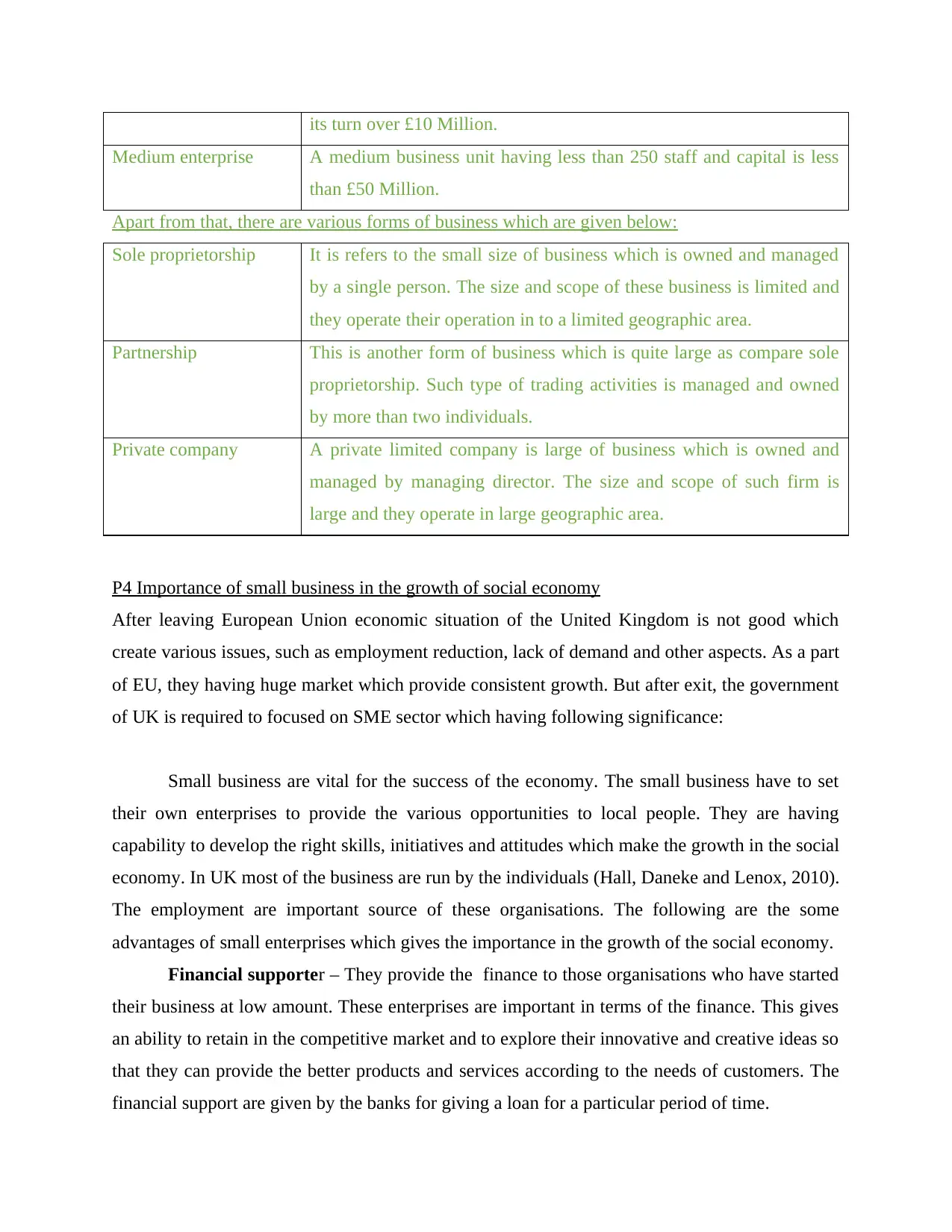
its turn over £10 Million.
Medium enterprise A medium business unit having less than 250 staff and capital is less
than £50 Million.
Apart from that, there are various forms of business which are given below:
Sole proprietorship It is refers to the small size of business which is owned and managed
by a single person. The size and scope of these business is limited and
they operate their operation in to a limited geographic area.
Partnership This is another form of business which is quite large as compare sole
proprietorship. Such type of trading activities is managed and owned
by more than two individuals.
Private company A private limited company is large of business which is owned and
managed by managing director. The size and scope of such firm is
large and they operate in large geographic area.
P4 Importance of small business in the growth of social economy
After leaving European Union economic situation of the United Kingdom is not good which
create various issues, such as employment reduction, lack of demand and other aspects. As a part
of EU, they having huge market which provide consistent growth. But after exit, the government
of UK is required to focused on SME sector which having following significance:
Small business are vital for the success of the economy. The small business have to set
their own enterprises to provide the various opportunities to local people. They are having
capability to develop the right skills, initiatives and attitudes which make the growth in the social
economy. In UK most of the business are run by the individuals (Hall, Daneke and Lenox, 2010).
The employment are important source of these organisations. The following are the some
advantages of small enterprises which gives the importance in the growth of the social economy.
Financial supporter – They provide the finance to those organisations who have started
their business at low amount. These enterprises are important in terms of the finance. This gives
an ability to retain in the competitive market and to explore their innovative and creative ideas so
that they can provide the better products and services according to the needs of customers. The
financial support are given by the banks for giving a loan for a particular period of time.
Medium enterprise A medium business unit having less than 250 staff and capital is less
than £50 Million.
Apart from that, there are various forms of business which are given below:
Sole proprietorship It is refers to the small size of business which is owned and managed
by a single person. The size and scope of these business is limited and
they operate their operation in to a limited geographic area.
Partnership This is another form of business which is quite large as compare sole
proprietorship. Such type of trading activities is managed and owned
by more than two individuals.
Private company A private limited company is large of business which is owned and
managed by managing director. The size and scope of such firm is
large and they operate in large geographic area.
P4 Importance of small business in the growth of social economy
After leaving European Union economic situation of the United Kingdom is not good which
create various issues, such as employment reduction, lack of demand and other aspects. As a part
of EU, they having huge market which provide consistent growth. But after exit, the government
of UK is required to focused on SME sector which having following significance:
Small business are vital for the success of the economy. The small business have to set
their own enterprises to provide the various opportunities to local people. They are having
capability to develop the right skills, initiatives and attitudes which make the growth in the social
economy. In UK most of the business are run by the individuals (Hall, Daneke and Lenox, 2010).
The employment are important source of these organisations. The following are the some
advantages of small enterprises which gives the importance in the growth of the social economy.
Financial supporter – They provide the finance to those organisations who have started
their business at low amount. These enterprises are important in terms of the finance. This gives
an ability to retain in the competitive market and to explore their innovative and creative ideas so
that they can provide the better products and services according to the needs of customers. The
financial support are given by the banks for giving a loan for a particular period of time.
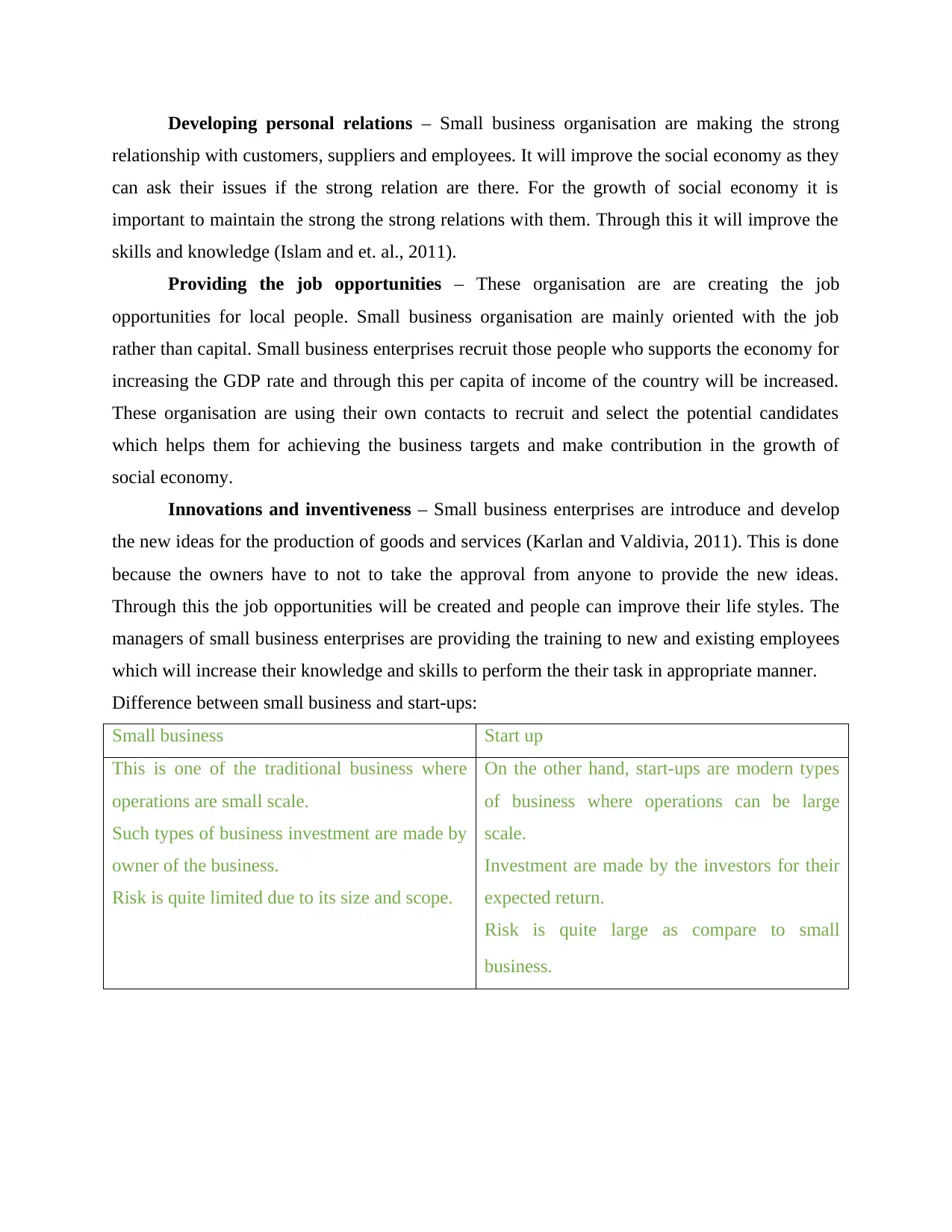
Developing personal relations – Small business organisation are making the strong
relationship with customers, suppliers and employees. It will improve the social economy as they
can ask their issues if the strong relation are there. For the growth of social economy it is
important to maintain the strong the strong relations with them. Through this it will improve the
skills and knowledge (Islam and et. al., 2011).
Providing the job opportunities – These organisation are are creating the job
opportunities for local people. Small business organisation are mainly oriented with the job
rather than capital. Small business enterprises recruit those people who supports the economy for
increasing the GDP rate and through this per capita of income of the country will be increased.
These organisation are using their own contacts to recruit and select the potential candidates
which helps them for achieving the business targets and make contribution in the growth of
social economy.
Innovations and inventiveness – Small business enterprises are introduce and develop
the new ideas for the production of goods and services (Karlan and Valdivia, 2011). This is done
because the owners have to not to take the approval from anyone to provide the new ideas.
Through this the job opportunities will be created and people can improve their life styles. The
managers of small business enterprises are providing the training to new and existing employees
which will increase their knowledge and skills to perform the their task in appropriate manner.
Difference between small business and start-ups:
Small business Start up
This is one of the traditional business where
operations are small scale.
Such types of business investment are made by
owner of the business.
Risk is quite limited due to its size and scope.
On the other hand, start-ups are modern types
of business where operations can be large
scale.
Investment are made by the investors for their
expected return.
Risk is quite large as compare to small
business.
relationship with customers, suppliers and employees. It will improve the social economy as they
can ask their issues if the strong relation are there. For the growth of social economy it is
important to maintain the strong the strong relations with them. Through this it will improve the
skills and knowledge (Islam and et. al., 2011).
Providing the job opportunities – These organisation are are creating the job
opportunities for local people. Small business organisation are mainly oriented with the job
rather than capital. Small business enterprises recruit those people who supports the economy for
increasing the GDP rate and through this per capita of income of the country will be increased.
These organisation are using their own contacts to recruit and select the potential candidates
which helps them for achieving the business targets and make contribution in the growth of
social economy.
Innovations and inventiveness – Small business enterprises are introduce and develop
the new ideas for the production of goods and services (Karlan and Valdivia, 2011). This is done
because the owners have to not to take the approval from anyone to provide the new ideas.
Through this the job opportunities will be created and people can improve their life styles. The
managers of small business enterprises are providing the training to new and existing employees
which will increase their knowledge and skills to perform the their task in appropriate manner.
Difference between small business and start-ups:
Small business Start up
This is one of the traditional business where
operations are small scale.
Such types of business investment are made by
owner of the business.
Risk is quite limited due to its size and scope.
On the other hand, start-ups are modern types
of business where operations can be large
scale.
Investment are made by the investors for their
expected return.
Risk is quite large as compare to small
business.
⊘ This is a preview!⊘
Do you want full access?
Subscribe today to unlock all pages.

Trusted by 1+ million students worldwide
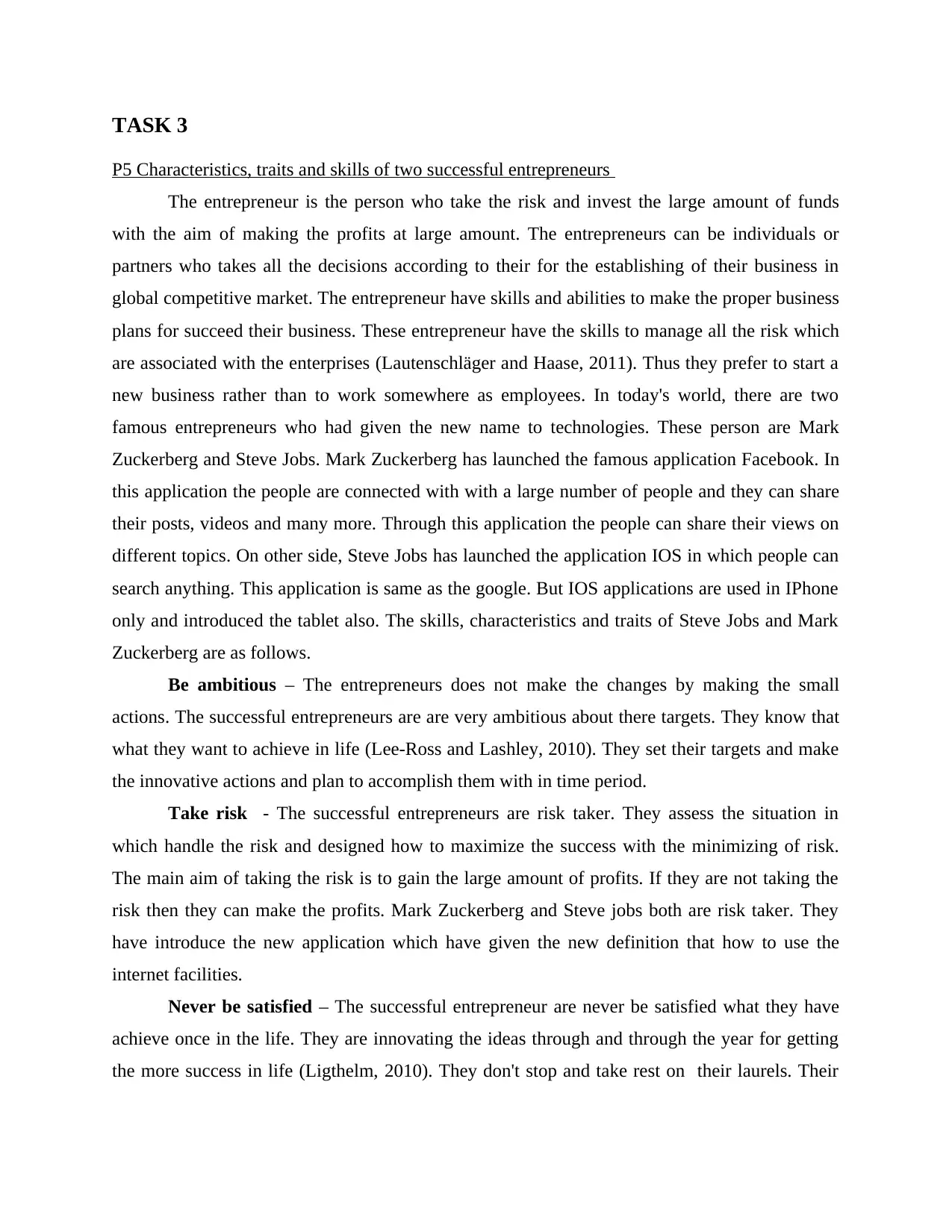
TASK 3
P5 Characteristics, traits and skills of two successful entrepreneurs
The entrepreneur is the person who take the risk and invest the large amount of funds
with the aim of making the profits at large amount. The entrepreneurs can be individuals or
partners who takes all the decisions according to their for the establishing of their business in
global competitive market. The entrepreneur have skills and abilities to make the proper business
plans for succeed their business. These entrepreneur have the skills to manage all the risk which
are associated with the enterprises (Lautenschläger and Haase, 2011). Thus they prefer to start a
new business rather than to work somewhere as employees. In today's world, there are two
famous entrepreneurs who had given the new name to technologies. These person are Mark
Zuckerberg and Steve Jobs. Mark Zuckerberg has launched the famous application Facebook. In
this application the people are connected with with a large number of people and they can share
their posts, videos and many more. Through this application the people can share their views on
different topics. On other side, Steve Jobs has launched the application IOS in which people can
search anything. This application is same as the google. But IOS applications are used in IPhone
only and introduced the tablet also. The skills, characteristics and traits of Steve Jobs and Mark
Zuckerberg are as follows.
Be ambitious – The entrepreneurs does not make the changes by making the small
actions. The successful entrepreneurs are are very ambitious about there targets. They know that
what they want to achieve in life (Lee-Ross and Lashley, 2010). They set their targets and make
the innovative actions and plan to accomplish them with in time period.
Take risk - The successful entrepreneurs are risk taker. They assess the situation in
which handle the risk and designed how to maximize the success with the minimizing of risk.
The main aim of taking the risk is to gain the large amount of profits. If they are not taking the
risk then they can make the profits. Mark Zuckerberg and Steve jobs both are risk taker. They
have introduce the new application which have given the new definition that how to use the
internet facilities.
Never be satisfied – The successful entrepreneur are never be satisfied what they have
achieve once in the life. They are innovating the ideas through and through the year for getting
the more success in life (Ligthelm, 2010). They don't stop and take rest on their laurels. Their
P5 Characteristics, traits and skills of two successful entrepreneurs
The entrepreneur is the person who take the risk and invest the large amount of funds
with the aim of making the profits at large amount. The entrepreneurs can be individuals or
partners who takes all the decisions according to their for the establishing of their business in
global competitive market. The entrepreneur have skills and abilities to make the proper business
plans for succeed their business. These entrepreneur have the skills to manage all the risk which
are associated with the enterprises (Lautenschläger and Haase, 2011). Thus they prefer to start a
new business rather than to work somewhere as employees. In today's world, there are two
famous entrepreneurs who had given the new name to technologies. These person are Mark
Zuckerberg and Steve Jobs. Mark Zuckerberg has launched the famous application Facebook. In
this application the people are connected with with a large number of people and they can share
their posts, videos and many more. Through this application the people can share their views on
different topics. On other side, Steve Jobs has launched the application IOS in which people can
search anything. This application is same as the google. But IOS applications are used in IPhone
only and introduced the tablet also. The skills, characteristics and traits of Steve Jobs and Mark
Zuckerberg are as follows.
Be ambitious – The entrepreneurs does not make the changes by making the small
actions. The successful entrepreneurs are are very ambitious about there targets. They know that
what they want to achieve in life (Lee-Ross and Lashley, 2010). They set their targets and make
the innovative actions and plan to accomplish them with in time period.
Take risk - The successful entrepreneurs are risk taker. They assess the situation in
which handle the risk and designed how to maximize the success with the minimizing of risk.
The main aim of taking the risk is to gain the large amount of profits. If they are not taking the
risk then they can make the profits. Mark Zuckerberg and Steve jobs both are risk taker. They
have introduce the new application which have given the new definition that how to use the
internet facilities.
Never be satisfied – The successful entrepreneur are never be satisfied what they have
achieve once in the life. They are innovating the ideas through and through the year for getting
the more success in life (Ligthelm, 2010). They don't stop and take rest on their laurels. Their
Paraphrase This Document
Need a fresh take? Get an instant paraphrase of this document with our AI Paraphraser
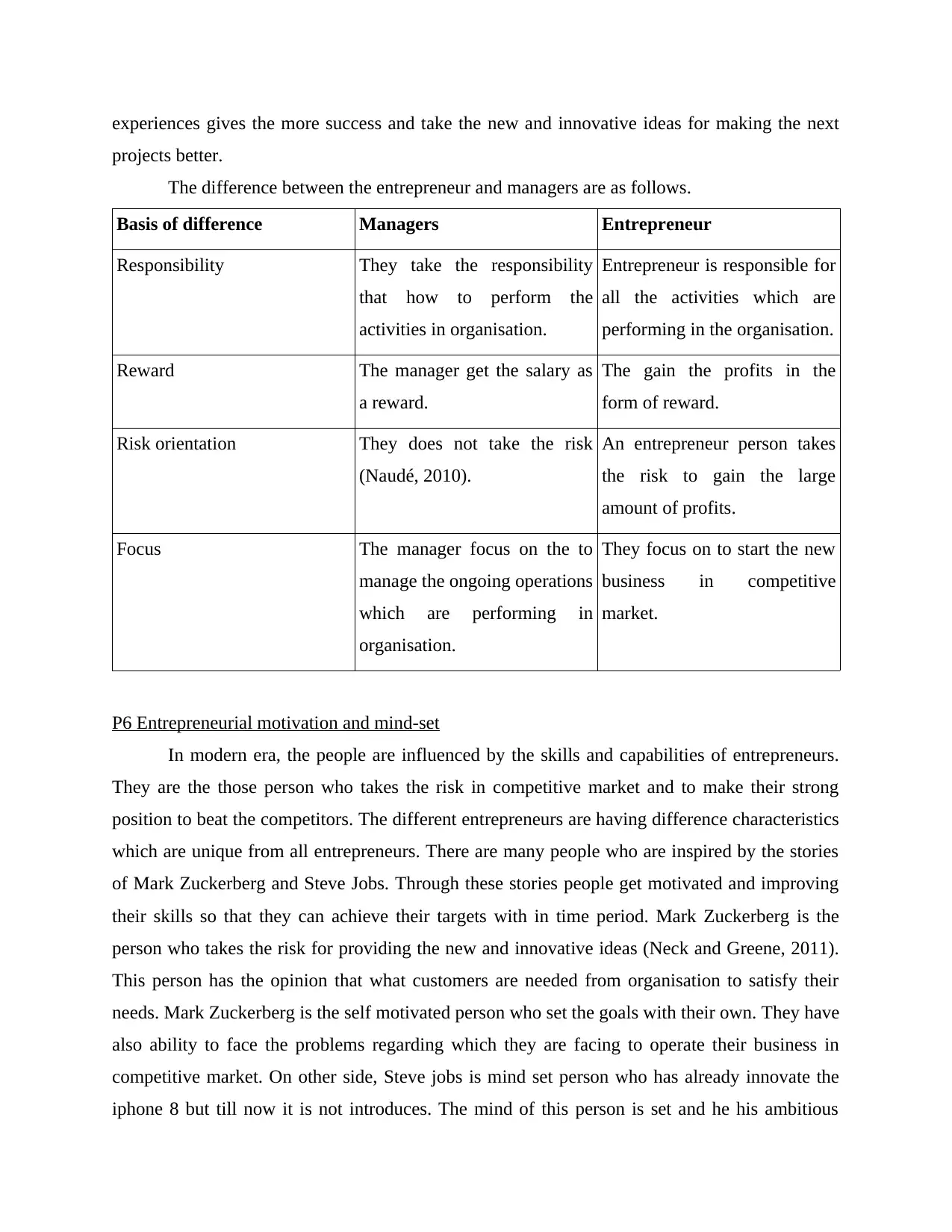
experiences gives the more success and take the new and innovative ideas for making the next
projects better.
The difference between the entrepreneur and managers are as follows.
Basis of difference Managers Entrepreneur
Responsibility They take the responsibility
that how to perform the
activities in organisation.
Entrepreneur is responsible for
all the activities which are
performing in the organisation.
Reward The manager get the salary as
a reward.
The gain the profits in the
form of reward.
Risk orientation They does not take the risk
(Naudé, 2010).
An entrepreneur person takes
the risk to gain the large
amount of profits.
Focus The manager focus on the to
manage the ongoing operations
which are performing in
organisation.
They focus on to start the new
business in competitive
market.
P6 Entrepreneurial motivation and mind-set
In modern era, the people are influenced by the skills and capabilities of entrepreneurs.
They are the those person who takes the risk in competitive market and to make their strong
position to beat the competitors. The different entrepreneurs are having difference characteristics
which are unique from all entrepreneurs. There are many people who are inspired by the stories
of Mark Zuckerberg and Steve Jobs. Through these stories people get motivated and improving
their skills so that they can achieve their targets with in time period. Mark Zuckerberg is the
person who takes the risk for providing the new and innovative ideas (Neck and Greene, 2011).
This person has the opinion that what customers are needed from organisation to satisfy their
needs. Mark Zuckerberg is the self motivated person who set the goals with their own. They have
also ability to face the problems regarding which they are facing to operate their business in
competitive market. On other side, Steve jobs is mind set person who has already innovate the
iphone 8 but till now it is not introduces. The mind of this person is set and he his ambitious
projects better.
The difference between the entrepreneur and managers are as follows.
Basis of difference Managers Entrepreneur
Responsibility They take the responsibility
that how to perform the
activities in organisation.
Entrepreneur is responsible for
all the activities which are
performing in the organisation.
Reward The manager get the salary as
a reward.
The gain the profits in the
form of reward.
Risk orientation They does not take the risk
(Naudé, 2010).
An entrepreneur person takes
the risk to gain the large
amount of profits.
Focus The manager focus on the to
manage the ongoing operations
which are performing in
organisation.
They focus on to start the new
business in competitive
market.
P6 Entrepreneurial motivation and mind-set
In modern era, the people are influenced by the skills and capabilities of entrepreneurs.
They are the those person who takes the risk in competitive market and to make their strong
position to beat the competitors. The different entrepreneurs are having difference characteristics
which are unique from all entrepreneurs. There are many people who are inspired by the stories
of Mark Zuckerberg and Steve Jobs. Through these stories people get motivated and improving
their skills so that they can achieve their targets with in time period. Mark Zuckerberg is the
person who takes the risk for providing the new and innovative ideas (Neck and Greene, 2011).
This person has the opinion that what customers are needed from organisation to satisfy their
needs. Mark Zuckerberg is the self motivated person who set the goals with their own. They have
also ability to face the problems regarding which they are facing to operate their business in
competitive market. On other side, Steve jobs is mind set person who has already innovate the
iphone 8 but till now it is not introduces. The mind of this person is set and he his ambitious
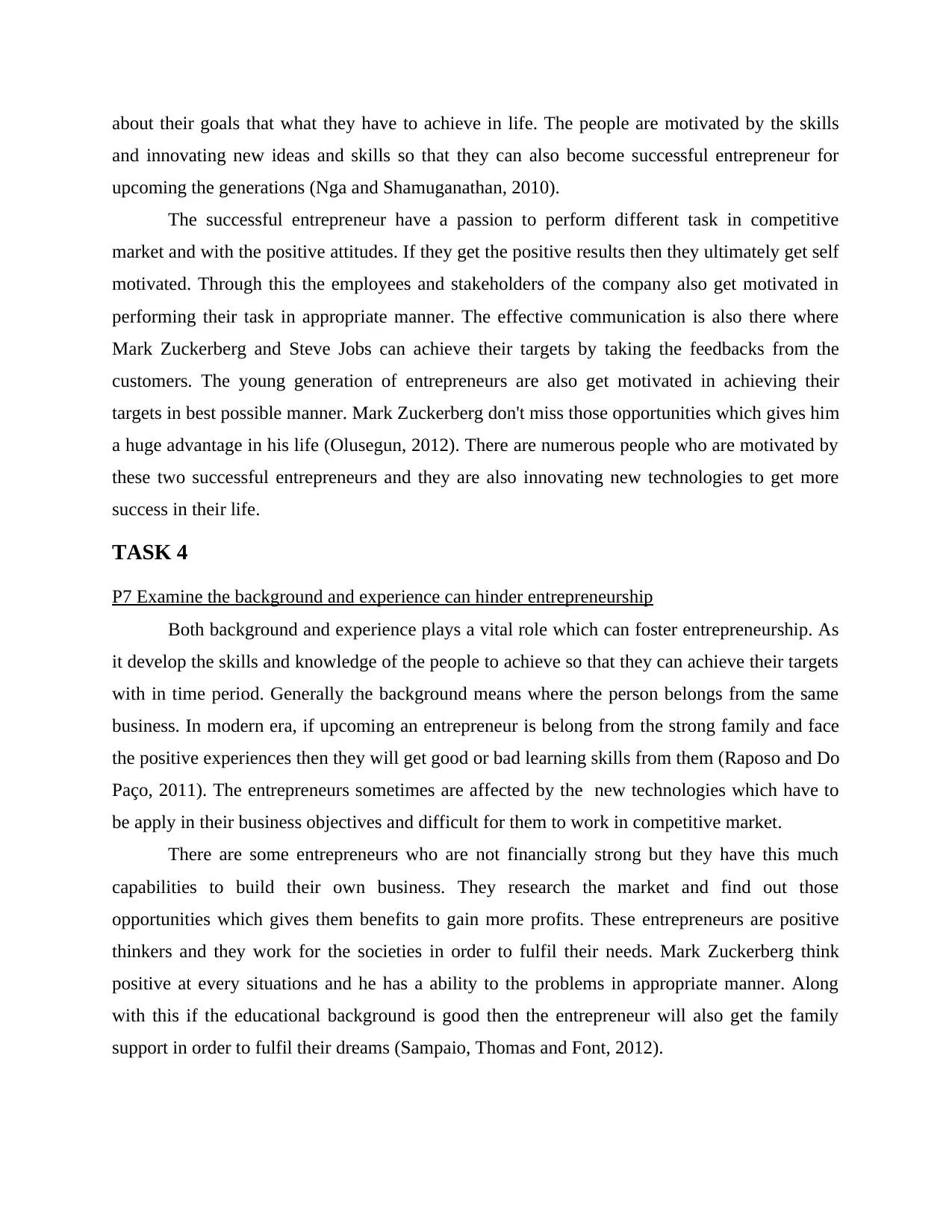
about their goals that what they have to achieve in life. The people are motivated by the skills
and innovating new ideas and skills so that they can also become successful entrepreneur for
upcoming the generations (Nga and Shamuganathan, 2010).
The successful entrepreneur have a passion to perform different task in competitive
market and with the positive attitudes. If they get the positive results then they ultimately get self
motivated. Through this the employees and stakeholders of the company also get motivated in
performing their task in appropriate manner. The effective communication is also there where
Mark Zuckerberg and Steve Jobs can achieve their targets by taking the feedbacks from the
customers. The young generation of entrepreneurs are also get motivated in achieving their
targets in best possible manner. Mark Zuckerberg don't miss those opportunities which gives him
a huge advantage in his life (Olusegun, 2012). There are numerous people who are motivated by
these two successful entrepreneurs and they are also innovating new technologies to get more
success in their life.
TASK 4
P7 Examine the background and experience can hinder entrepreneurship
Both background and experience plays a vital role which can foster entrepreneurship. As
it develop the skills and knowledge of the people to achieve so that they can achieve their targets
with in time period. Generally the background means where the person belongs from the same
business. In modern era, if upcoming an entrepreneur is belong from the strong family and face
the positive experiences then they will get good or bad learning skills from them (Raposo and Do
Paço, 2011). The entrepreneurs sometimes are affected by the new technologies which have to
be apply in their business objectives and difficult for them to work in competitive market.
There are some entrepreneurs who are not financially strong but they have this much
capabilities to build their own business. They research the market and find out those
opportunities which gives them benefits to gain more profits. These entrepreneurs are positive
thinkers and they work for the societies in order to fulfil their needs. Mark Zuckerberg think
positive at every situations and he has a ability to the problems in appropriate manner. Along
with this if the educational background is good then the entrepreneur will also get the family
support in order to fulfil their dreams (Sampaio, Thomas and Font, 2012).
and innovating new ideas and skills so that they can also become successful entrepreneur for
upcoming the generations (Nga and Shamuganathan, 2010).
The successful entrepreneur have a passion to perform different task in competitive
market and with the positive attitudes. If they get the positive results then they ultimately get self
motivated. Through this the employees and stakeholders of the company also get motivated in
performing their task in appropriate manner. The effective communication is also there where
Mark Zuckerberg and Steve Jobs can achieve their targets by taking the feedbacks from the
customers. The young generation of entrepreneurs are also get motivated in achieving their
targets in best possible manner. Mark Zuckerberg don't miss those opportunities which gives him
a huge advantage in his life (Olusegun, 2012). There are numerous people who are motivated by
these two successful entrepreneurs and they are also innovating new technologies to get more
success in their life.
TASK 4
P7 Examine the background and experience can hinder entrepreneurship
Both background and experience plays a vital role which can foster entrepreneurship. As
it develop the skills and knowledge of the people to achieve so that they can achieve their targets
with in time period. Generally the background means where the person belongs from the same
business. In modern era, if upcoming an entrepreneur is belong from the strong family and face
the positive experiences then they will get good or bad learning skills from them (Raposo and Do
Paço, 2011). The entrepreneurs sometimes are affected by the new technologies which have to
be apply in their business objectives and difficult for them to work in competitive market.
There are some entrepreneurs who are not financially strong but they have this much
capabilities to build their own business. They research the market and find out those
opportunities which gives them benefits to gain more profits. These entrepreneurs are positive
thinkers and they work for the societies in order to fulfil their needs. Mark Zuckerberg think
positive at every situations and he has a ability to the problems in appropriate manner. Along
with this if the educational background is good then the entrepreneur will also get the family
support in order to fulfil their dreams (Sampaio, Thomas and Font, 2012).
⊘ This is a preview!⊘
Do you want full access?
Subscribe today to unlock all pages.

Trusted by 1+ million students worldwide
1 out of 15
Related Documents
Your All-in-One AI-Powered Toolkit for Academic Success.
+13062052269
info@desklib.com
Available 24*7 on WhatsApp / Email
![[object Object]](/_next/static/media/star-bottom.7253800d.svg)
Unlock your academic potential
Copyright © 2020–2026 A2Z Services. All Rights Reserved. Developed and managed by ZUCOL.





